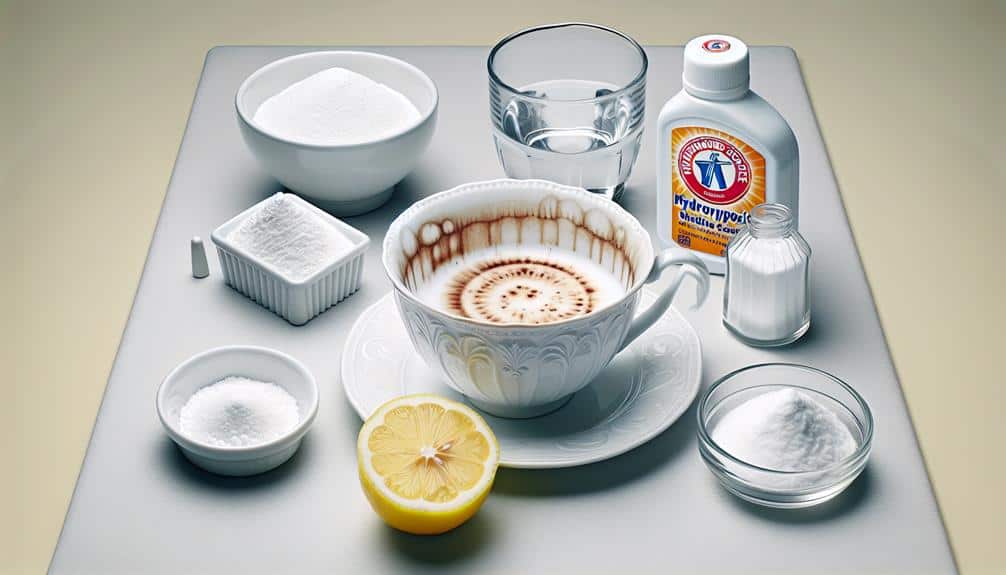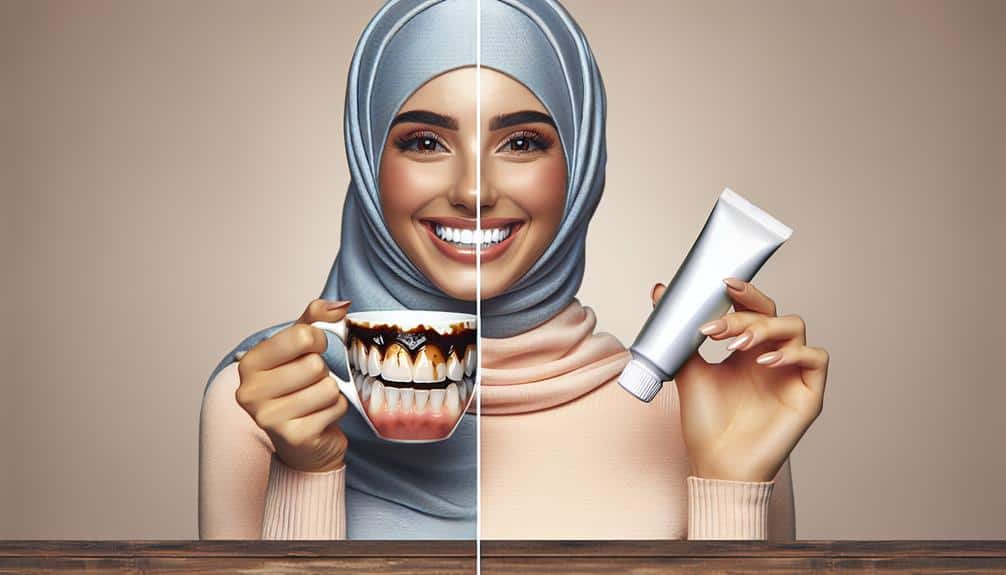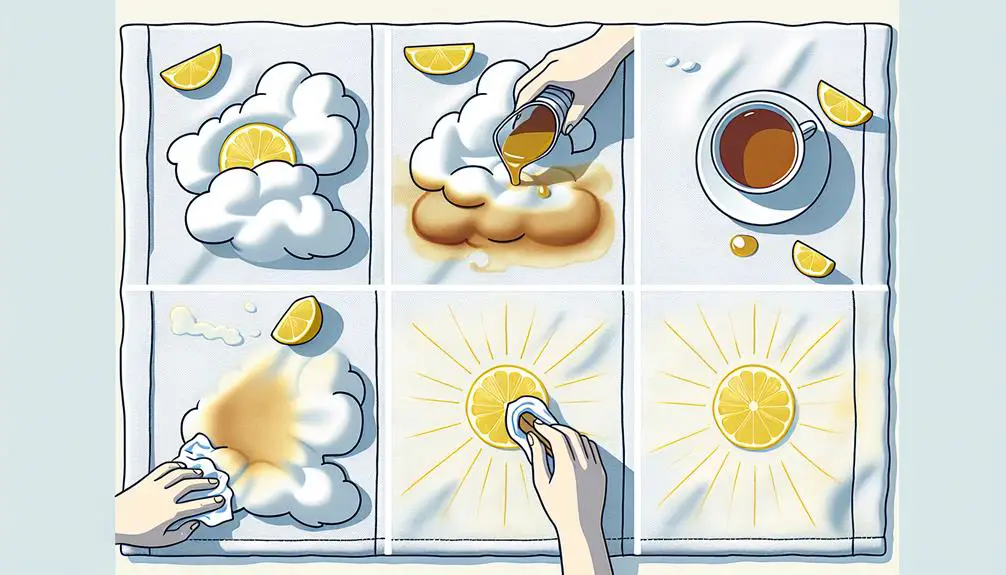To tackle stubborn tea stains on your teeth, consider professional treatments like in-office whitening procedures for efficient results with enamel protection. At-home kits with peroxide-based solutions offer reliable whitening, surpassing regular toothpaste. Natural remedies such as baking soda paste or apple cider vinegar can aid in stain removal. Laser whitening targets deep tea stains effectively in a short, cost-effective session while reducing teeth sensitivity. Prevent tea stains by brushing regularly, using floss, an alcohol-free mouthwash, and rinsing with water post-tea consumption. These methods promise brighter teeth; further insights await on the benefits of each approach.
Key Points
- Professional whitening treatments offer stronger and efficient results with enamel protection.
- At-home kits with peroxide-based solutions provide reliable whitening for stubborn tea stains.
- Natural remedies like baking soda, vinegar, strawberries, and charcoal can help whiten teeth.
- Laser procedures effectively target deep tea stains, minimizing sensitivity and offering cost-effective results.
- Prevent tea stains by regular brushing, flossing, using alcohol-free mouthwash, and rinsing mouth after tea.
Professional Teeth Whitening Treatments
Professional teeth whitening treatments offer a highly effective solution for removing stubborn tea stains and achieving a brighter smile. When considering enamel protection during whitening procedures, consulting with a dentist is essential. Dentists can provide personalized recommendations based on individual enamel health and guarantee that the whitening process is safe and effective.
During a dentist consultation for professional teeth whitening, the dentist will evaluate the current state of your teeth and gums to determine the most suitable whitening treatment. This personalized approach helps in safeguarding the enamel while effectively removing tea stains. Dentists may also offer in-office whitening treatments that are stronger and more efficient than over-the-counter options.
Enamel protection is a key concern during any whitening procedure, as enamel erosion can lead to increased tooth sensitivity and other dental issues. Professional treatments, when done under the supervision of a dentist, can minimize the risk of enamel damage while providing noticeable whitening results. Consult with your dentist to explore the best professional teeth whitening options for your specific needs.
At-Home Whitening Kits and Strips
When considering whitening your teeth at home to tackle tea stains, exploring the effectiveness of at-home whitening kits and strips can be a practical option.
At-home whitening kits typically contain a bleaching agent, usually hydrogen peroxide or carbamide peroxide, which helps break down stains on the teeth. These kits often come with trays that mold to your teeth, guaranteeing even application of the whitening solution.
Whitening strips are another popular choice, coated with a peroxide-based gel that you apply directly to your teeth.
DIY whitening remedies are widely available, but at-home whitening kits and strips are formulated with professional-grade ingredients, offering more reliable results. While whitening toothpaste options can help maintain your teeth's brightness, they're less effective at removing stubborn tea stains compared to at-home whitening kits and strips.
It's important to adhere to the instructions carefully to avoid potential risks such as tooth sensitivity or gum irritation. Consider consulting with your dentist before starting any at-home whitening treatment to ensure it's suitable for your teeth.
Natural Remedies for Tea Stains
Exploring natural remedies can offer an alternative approach to combating tea stains on your teeth, providing a more organic option to tackle discoloration. When dealing with tea stains, consider the following herbal remedies and DIY solutions:
- Baking Soda: Create a paste using baking soda and water to gently scrub away surface stains caused by tea consumption.
- Apple Cider Vinegar: Use apple cider vinegar as a mouthwash or mix it with baking soda for a deeper clean to help remove tea stains.
- Strawberries: The malic acid in strawberries can help whiten teeth naturally. Mash a strawberry and mix it with baking soda to create a paste for brushing.
- Activated Charcoal: Although messy, activated charcoal can assist in removing stains by adsorbing toxins and surface stains from tea.
These natural remedies offer a chemical-free approach to brightening your smile and combating stubborn tea stains. Remember, consistency is key when using natural methods for teeth whitening.
Laser Teeth Whitening Procedures
Considering laser teeth whitening procedures for removing stubborn tea stains can provide efficient and lasting results. With the advancements in laser technology, these procedures have become increasingly effective in targeting deep stains caused by tea consumption. The laser energy activates the whitening agent, allowing it to penetrate the enamel and break down the discolored molecules, resulting in a brighter smile.
One of the benefits of laser teeth whitening is its ability to minimize teeth sensitivity compared to traditional whitening methods. The procedure is usually quick, taking around 30 to 60 minutes per session, making it a convenient option for individuals with busy schedules. Although the cost of laser teeth whitening may be higher initially, its long-term effectiveness and durability make it a cost-effective choice in the battle against stubborn tea stains.
Tips for Preventing Tea Stains
To prevent tea stains on your teeth, adopting good oral hygiene practices is key. Here are some tips to help you maintain a bright smile and prevent those stubborn tea stains:
- Regular brushing: Brush your teeth at least twice a day to remove plaque and surface stains caused by tea consumption.
- Flossing: Don't forget to floss daily to clean between your teeth where your toothbrush can't reach effectively.
- Mouthwash use: Incorporate an alcohol-free mouthwash into your oral care routine to help reduce bacteria and prevent staining.
- Water rinsing: After consuming tea, rinse your mouth with water to help wash away any residue that could lead to staining.
Frequently Asked Questions
Can Drinking Tea Through a Straw Help Prevent Tea Stains on Teeth?
Drinking tea through a straw can help prevent tea stains on your teeth. This practice reduces direct contact between the tea and your teeth, minimizing the risk of discoloration. It's a simple dental hygiene tip with visible benefits.
Is It Safe to Use Activated Charcoal Toothpaste to Whiten Teeth With Tea Stains?
When considering whitening teeth stained by tea, it's wise to evaluate the safety and effectiveness of activated charcoal toothpaste. While it can offer some benefits, alternative whitening methods like professional treatments may provide more reliable results.
Are There Any Specific Foods or Drinks to Avoid to Prevent Tea Stains on Teeth?
To prevent tea stains on teeth, watch your diet and lifestyle. Avoid frequent consumption of dark teas, coffee, and red wine. Rinse your mouth with water after enjoying them. Maintain good oral hygiene habits for a bright smile.
How Long Do the Effects of Laser Teeth Whitening Procedures Last for Removing Tea Stains?
To maintain long term results from laser teeth whitening for removing tea stains, consistent care is key. The effectiveness of the procedure can last for several years with proper maintenance. Regular dental check-ups help guarantee lasting brightness.
Can Using a Whitening Toothpaste Specifically Designed for Tea Stains Be More Effective Than Regular Whitening Toothpaste?
Want to prevent those stubborn tea stains? Consider using a whitening toothpaste designed specifically for tea stains. These toothpastes can be more effective than regular whitening toothpaste due to their targeted formulation for combating tea discoloration.



